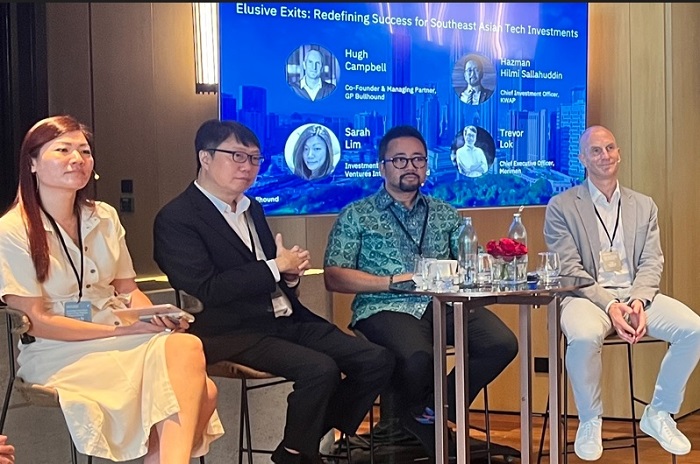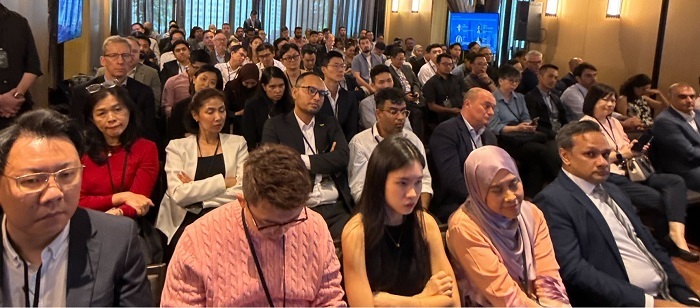GP Bullhound launches first Southeast Asia Office in KL - ‘Malaysia is close to our hearts’
By Lan Ghafar December 13, 2024
- Sustainable growth requires time, talent, founder ambition, good fortune
- SEA tech report highlights growing potential of B2B software firms in region

“Malaysia is close to our hearts. Through community engagement, expert advisory, and strategic investment, we’re committed to fostering its rise as a globally acclaimed tech ecosystem,” said Hugh Campbell, co-founder and managing partner of GP Bullhound, a London based technology advisory and investment firm that has facilitated around 290 deals with 106 being funding rounds.
The first step in realising Campbell’s goal was taken on Dec 4, with the launch of GP Bullhound’s Southeast Asia 2024 Tech Report in Kuala Lumpur. Co-hosted with North Ridge Partners, a Singapore based boutique technology advisory firm founded in 2003 that is a global partner to GP Bullhound, the event also marked GP Bullhound’s first Southeast Asia office in Kuala Lumpur and gathered industry leaders, investors, and tech enthusiasts to explore scaling opportunities, exit challenges, and the future of innovation in the region.
Unlocking Malaysia’s tech potential
Campbell reflected on the firm’s journey since 1999, its commitment to innovation, and Southeast Asia’s pivotal role, spotlighting Malaysia’s vast potential.
“Malaysia holds great promise in the tech sector. Penang is already recognized as a global semiconductor hub, and Johor is beginning to develop an exciting data cluster. The potential is undeniable. However, the region still lacks a strong presence of breakthrough tech companies,” he said.
The report highlighted the success of initiatives like Invest Penang, which attracted over RM50 billion in foreign investments in 2023. “Sustainable growth requires time, talent, collaboration, founder ambition, and good fortune,” said Campbell. He praised Malaysia’s skilled, English-speaking workforce and pro-business environment as ideal for global tech expansion.

Tech report: Confronting realities, lifting ambitions
Following Campbell’s keynote, GP Bullhorn senior advisor, Shahril Hamdan and managing director Ravi Ghedia presented the GP Bullhound Southeast Asia Tech Report, offering a comprehensive analysis of the region’s growth trajectories, key players, and challenges.
Shahril emphasized the region’s diversity. “The region’s 650 million people form a vibrant mosaic of cultures, and success here requires navigating cultural nuances and regulatory landscapes.” He also highlighted government initiatives like Malaysia’s Scale 20, Indonesia’s Startup Studio, and Thailand’s startup programs, which have nurtured early-stage funding ecosystems.
However, Shahril pointed out a critical gap in growth-stage funding. “While early-stage capital is available, access to growth capital remains a major hurdle.” Despite active participation from early-stage VCs and sovereign funds, the lack of liquidity restricts startups’ ability to scale.
Ravi discussed the need for better exit mechanisms. “Without local or regional funding, promising startups struggle to grow.” He proposed public-private partnerships, regional M&A activities, and fostering ‘startup factories’ to support the next generation of entrepreneurs.
Shahril also highlighted the growing potential of B2B software companies, stating, “We’re seeing a shift toward B2B innovation in Southeast Asia.” The report forecasts Southeast Asia’s software market to grow from US$7 billion (RM31.06 billion) in 2023 to US$12.9 billion (RM57.24 billion) by 2032, with sectors like fintech, e-commerce, and manufacturing leading the way. Additionally, verticalized software such as cybersecurity, procurement, and automation are rising, driven by AI and analytics.
The report also underscores Southeast Asia’s strategic location, acting as a vital hub in global trade. ‘Friend-shoring,’ driven by the need for supply chain resilience, is fueling foreign investments, particularly in Vietnam, Thailand, and Malaysia. This shift is reflected in the growing share of U.S. and EU buyers in the region, which increased from 15% in 2020 to 23% in 2023.
Elusive exits: Redefining success for Southeast Asian tech investments
The event featured a panel discussion moderated by Shahril, with insights from Hazman Hilmi, Chief Investment Officer at KWAP; Sarah Tan, Investment Partner at OSK Ventures; Trevor Lok, founder of Merimen, and Campbell. The panel delved into the challenges and evolving strategies surrounding exits in Southeast Asia’s tech ecosystem.
Hazman discussed structural issues within the ecosystem and shared the fund’s efforts to drive sustainable growth. “We began our venture investment program in 2016, but quickly realized that for the ecosystem to thrive, we needed a more sustainable approach,” he explained. KWAP’s Dana Perintis, launched in 2023 with RM500 million, aims to invest across the startup lifecycle—from seed funding to later-stage capital—to establish a strong pipeline for exits.
Lok, echoed similar challenges, sharing his journey of building a startup in an underdeveloped ecosystem. “In the early 2000s, there was no clear funding structure. We had to bootstrap and achieve profitability,” he said.
Tan acknowledged the growing difficulty of exits but identified trade sales as a viable path in the B2B enterprise tech space. “The real challenge now is exits,” she said, noting the difficulty of scaling companies from Series B to Series C. Many founders struggle with scaling processes and empowering their teams at this stage, emphasizing the importance of mentorship and bridging knowledge gaps between investors and entrepreneurs.
Campbell, offering an international perspective from his 25 years of experience in tech IPOs and M&A, underscored the importance of relationships in successful exits. “People buy companies from people they know,” he stated, highlighting the need for early engagement with potential buyers and the role of storytelling in making companies attractive for acquisition.
Hazman also pointed out Malaysia’s “chicken-and-egg” dilemma, where limited capital restricts deal flow, and fewer deals lead to less capital. KWAP’s strategy aims to disrupt this cycle by investing in early-stage ventures and secondary funds, while also promoting co-investments through initiatives like Dana Pemacu, which targets later-stage private equity.
Tan advised to having an open when it comes to the all-important exit strategy. “Founders should remain open to alternative exit strategies like secondary sales or strategic acquisitions, rather than focusing solely on IPOs.”
Educating founders about these options early, she explained, would help ensure smoother, more successful exits in the long term.
Related Stories :


